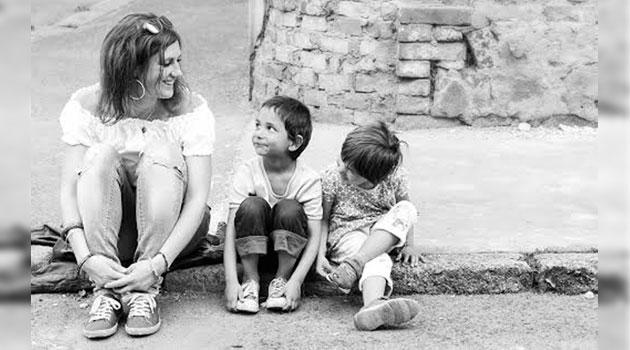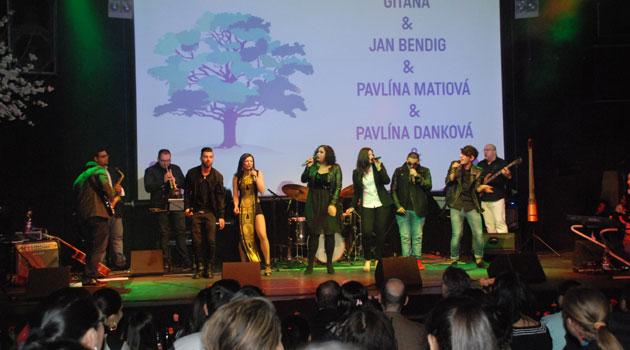Together We Can: Staffer of youth drop-in center says differences between Czech and Romani youth are minimal

News server Romea.cz has been regularly publishing interviews this year with people who are involved in interesting work that aids inter-ethnic coexistence in the Czech Republic. Beginning in May, interviewer Dana Moree also began asking her interviewees questions about terms that have contested meanings – words like “Czech”, “gadjo”, “Roma”, etc.
Interview with Pavlína Daňhelková
Pavlína Daňhelková works for the People in Need organization in the Předlice ghetto of Ústí nad Labem. She has travelled the world and spices up her work here at home with the broadest possible range of creative ideas – together with the boys and girls in Předlice, for example, she has begun broadcasting an internet show called “TV Předlice”.
Q: What, in your view, is it necessary to do for us to live well here together?
A: I work at the organization People in Need, specifically in a drop-in club in Ústí nad Labem, in Předlice. We opened the club five years ago, first for youth, and now the target group also includes children and young adults as well as youth (i.e., anybody between the ages of six and 26). Well, within the framework of the club we do many things and we also target the locality itself, because Předlice is a quarter of Ústí that is under a grey cloud, everybody else perceives it to be some kind of place for bums or the criminal element, but I do not believe that at all. I think there is great potential there exactly in the children and youth with whom we work. One of the things we did or began to do three years ago is “TV Předlice”, we established our own television channel that broadcasts subject matter from the neighborhood as well as society-wide topics that the local boys and girls come up with. We have begun to film reportages, that’s one of the things that started us not just noticing the problems we have, but also thinking about society and the place we live.
Q: Where can we find your news reporting?
A: On People in Need’s Facebook page and YouTube channel, under the Ústí nad Labem branch.
Q: What does “Together We Can” mean to you and why do you do it?
A: I believe that many people here look askance at Romani people unnecessarily, with prejudice, and it’s not even because somebody Romani did something to them specifically – rather, it’s a kind of tradition that runs in our society. It seems a shame to me.
Q: How did you arrive at this position?
A: I have experience from working for some time in Uganda. My first “African experience” was in Zambia, where I was on a work internship, and in both states I noticed there was a simple joy people got out of life from the small, everyday things. Here in the Czech Republic everybody is constantly annoyed about everything, that’s the oppressive element for me here. It’s something I am constantly struggling with here. I don’t want everybody to be annoyed by everything, on the contrary, I want them to do something to make themselves happy.
Q: Have you found any examples of anybody beginning to take charge of their own happiness?
A: I believe people influence each other. In the work I do it is difficult to answer the frequently-asked question of whether there is a point to it. For me, there is. It’s the same when we ask why we should paint the fence when the paint will eventually chip off anyway. The impact of social work is practically unmeasurable. I don’t know what would happen if we didn’t collaborate on this together – maybe the boys and girls would advise themselves, I don’t know. I can give you one concrete example of a boy who now is also a colleague – he’s a guy who began visiting the drop-in center when we opened it. The boys began coming there with enthusiasm and we did activities that involved going into the locality, we painted a wall in Předlice, we repaired benches, we addressed their individual needs and problems. One of the boys became my colleague three months ago, which is really fine, because he has basically been there just as long as I have. Even though he’s a guy who has just completed primary school [ninth grade] he is a role model for the others and he has begun working at the club. For now he’s only there through a project for the unemployed, but even so, in my opinion he is a good example for the others. I’m happy about the little things here – we managed to organize a field trip to Prague, where many of these young boys and girls had never been. They are 15 or 16, they are blown away by it all, they are amazed by the trams, that people sit on the grass, that the escalators are so long and the metro so fast… I am also always glad when a child gets a top grade at school because we have been teaching them, when the boys began practicing football they would work hard every day and the older boys would lead the younger ones, just like the older girls lead the dance ensemble, they actively prepare collections and festivals too. Together we have worked on events that are really very important and right to do. They dedicate the energy that young people simply have for such things to this work.
Q: What do words like “Czech”, “gadjo”, “Rom” mean to you?
A: I don’t use any of those words, I say “the boys and girls from Předlice”, when I have the need to somehow localize what kind of group this is. I don’t know, it seems strange to me, I don’t really understand why we should draw those distinctions. They are Czechs and so are we and for me the differences between our cultures are minimal. I was just in India for three months where I was working in the Himalayas and then I traveled through India and the cultures there are so terribly different from each other that it seems to me that even the tribes of Africa are more similar to each other than an Indian living by the sea is to an Indian in the Himalayas. Our definitions here are absolutely unclear to me because the differences are seriously minimal. The differences between the cultures that I have experienced can be far greater than they are between us here. We are all terribly much the same here, we’re just making a mountain out of a molehill.
Q: What are your dreams? If you had a magic wand, what would you conjure up?
A: I guess I would like it if all of us could do our best to be more good than bad, and to behave well towards others instead of badly. I believe that works when people really try to do the best they can. When we do, the best things come back to us in return.
